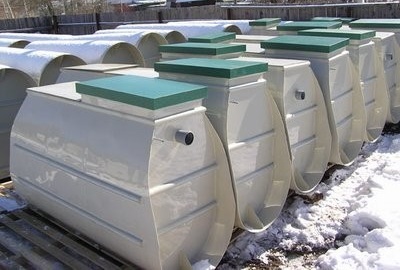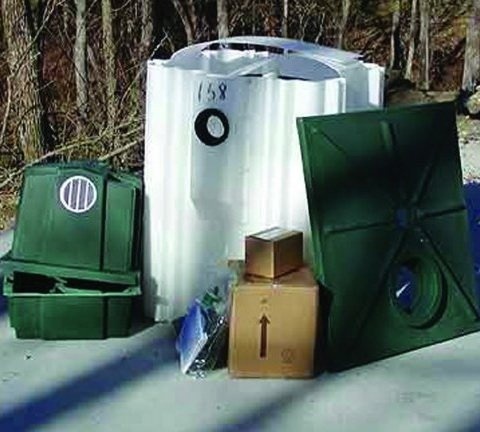Brief overview of the Flotenk septic tank + self-assembly example
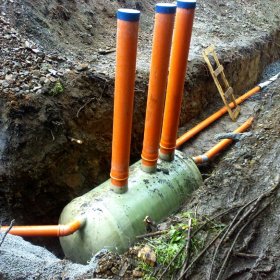
Companies specializing in the production of powerful sewage treatment plants take care of the owners of small summer cottages, producing models of lower productivity. Compact tanks, consisting of several sections, occupy a minimum of useful territory and are able to serve several residents of a suburban cottage. One of these structures is a non-volatile septic tank flotenk.
The device of this septic tank
Material for the manufacture of a sealed frame is a durable and wear-resistant fiberglass. The basis of wastewater treatment is the separation of particles into sediment and suspension with simultaneous anaerobic decomposition of biomass. The initial treatment in the septic tank ends with the discharge of water to the filtration site.

Septic tank does not purify wastewater by 100%, so further treatment takes place in specially designed facilities - filter tunnels
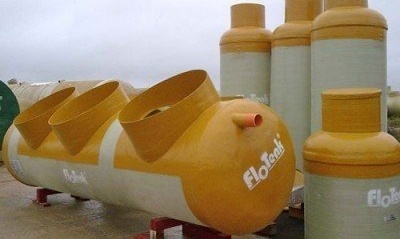
The Flotenk company produces not only septic tanks for household waste, but also other treatment facilities, for example, equipment for storm sewers, fuel tanks
The treatment plant is presented in the form of a tank divided into three interconnected chambers. Each of them performs its function:
- A - primary sedimentation tank, in which a coarse sediment lingers;
- B - secondary sump for deeper cleaning;
- C - wastewater illuminator.
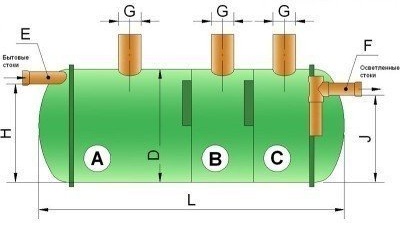
The diagram shows a standard septic tank Flotenk device. The housing consists of three treatment sections, the largest of which is the reception (A)
The first chamber is connected to the inlet pipe, then to the second compartment through a blocking system. The second and third chambers communicate using a water seal. In order for the installation to work stably, its upper part is insulated, creating the desired temperature regime.
The principle of biological treatment
Purification of domestic wastewater occurs gradually, as they progressively pass through all sections of the septic tank.
Contaminated water flows by gravity through the sewer from the house into the first section of the structure. In order to prevent clogging, the nozzle is inserted in such a way that the outlet is below the level of effluents. In this compartment, most of the contaminants are retained: fats and films floating up on the surface, heavy particles settling to the bottom.
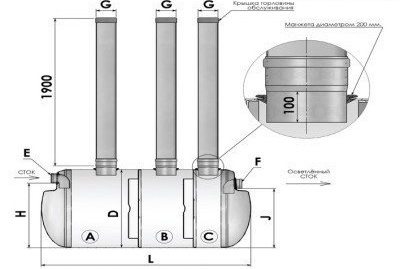
The treatment tank is equipped with pipes facing the surface - one in each section. They are necessary for pumping out solid sediment.
Oxygen deficiency is the cause of the anaerobic process, which can conditionally be divided into two stages:
- Sour fermentation. All substances, including fats, are decomposed to that stage until they turn into lower fatty acids (butyric, formic, acetic), alcohols, hydrogen sulfide, carbon dioxide.
- Methane fermentation. Alcohols and fatty acids finally decompose, forming hydrogen, carbon dioxide, methane.
Having overcome the blocker, the effluents enter the second section for further sedimentation. Overflows are above the level of sedimentary masses and below the floating on the surface of the fatty films. In this compartment, in addition to the mechanical, anaerobic processing continues.
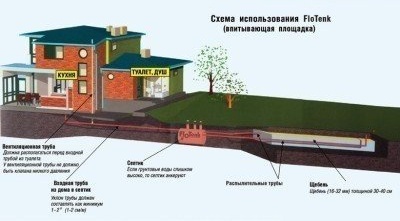
The septic tank is located near the house and taking into account the fact that a separate plot of land will be occupied by an equipped filtration field
In the third section, suspended organic particles form a precipitate, and almost purified water flows through a pipe to the filtration field for final purification.
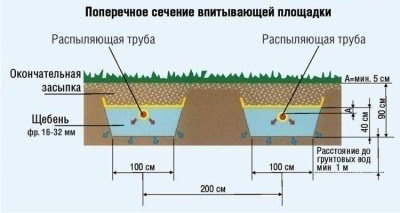
When installing a filtration tunnel (drainage field), it is necessary to take into account the distance to some objects, for example, groundwater must be at a distance of at least 1 m
Installation of a Flotenk treatment plant
Installing a Flotenk septic tank is not much different from installing other treatment plants: you need to dig a large hole under the tank and bring the pipeline to it from both sides. Domestic effluents move to the septic tank by gravity, therefore, when laying sewer pipes, a small angle of inclination should be ensured - approximately 4-6 cm / meter. If the pipes are laid in the freezing zone of the soil, you need to consider their insulation.
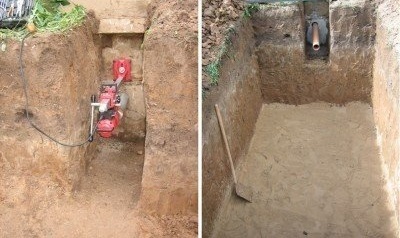
Sewer pipelines are laid in holes laid using diamond drilling. The soil is removed manually, and at the bottom of the pit, a sand cushion is arranged
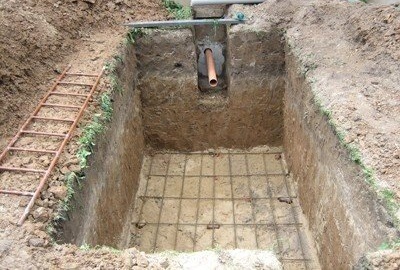
Before pouring the sand base with concrete mortar, it is reinforced with the help of reinforcement: a frame connected in the form of a lattice is placed at the bottom
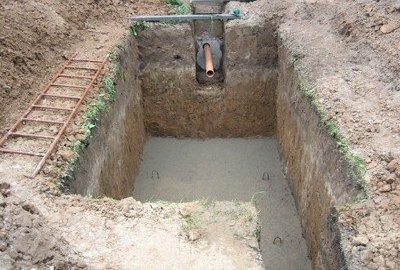
A concrete solution is prepared and the bottom of the pit is poured in such a way that a strong plate is obtained. It guarantees the treatment equipment stability and immobility.
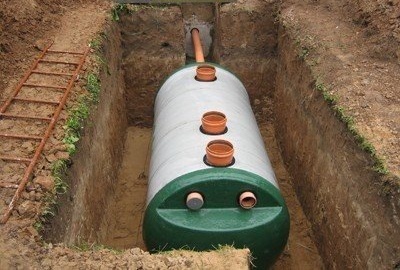
Septic tank installed in the pit. To ensure immobility, additional fixation is used - a stainless steel cable mounted on anchor rings mounted in the base
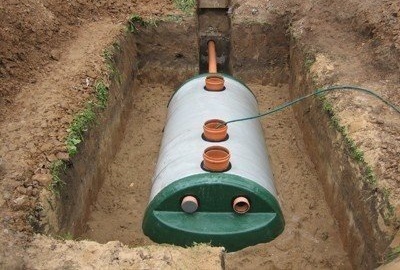
Backfill the sewage treatment plant by placing excavated soil in a foundation pit. Before using the septic tank, pour clean water inside.
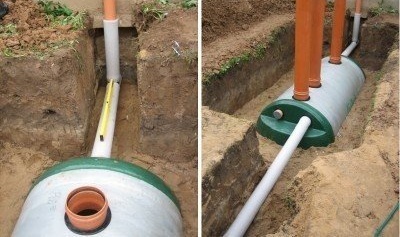
Supply pipes must be carefully insulated, then install a fan riser. Lastly, install the upper extension necks
Together with the septic tank, an infiltration tunnel is installed, equipped with plugs and connected by a pipeline.
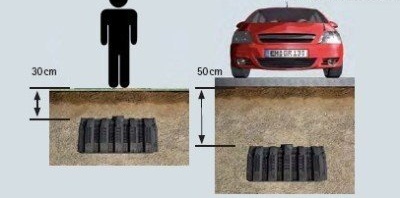
The foundation pit for the filtration tunnel is torn out taking into account what will be above it. If it is installed at a depth of 50 cm, then over it you can arrange travel or parking
The filtration system can be represented by several modules, which are located in one serial or several parallel lines.
Customer reviews for these models
Flotenk septic tanks are in demand for various reasons.
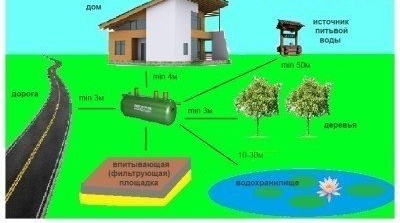
With proper installation and location of the septic tank, the summer cottage is freed from contaminated effluents, and completely purified water enters the reservoir
Analyzing the reviews of owners of suburban housing, we can highlight several of the most positive points:
- Non-volatility of a sewage treatment plant. Even with an emergency power outage, the septic tank works as usual.
- The durability of the composite material is fiberglass. Throughout the entire period of use, the tightness of the housing is not broken.
- Easy to install septic tank and connect it to the pipeline. All work can be done independently.
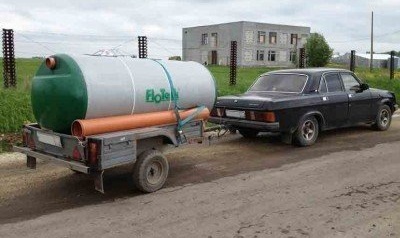
Knowing the structure of the treatment plant, the principle of its operation, installation rules, you can independently install the Flotenk septic tank in a summer cottage
Equipment maintenance does not cause complications, but the only minus is associated with it. For the effective operation of the installation, approximately 1 time in 1-3 years (as it becomes soiled), it is necessary to call the sewage machine in order to remove solid insoluble sediment.
